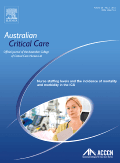
Australian Critical Care
Scope & Guideline
Elevating standards in critical care and emergency nursing.
Introduction
Aims and Scopes
- Clinical Practice and Guidelines:
Focuses on the development, implementation, and evaluation of clinical guidelines and best practices in critical care settings to enhance patient safety and care quality. - Patient Outcomes and Quality of Life:
Investigates the long-term outcomes of critically ill patients, including quality of life post-ICU stay, and factors influencing recovery. - Innovative Care Models:
Explores new models of care delivery in ICUs, including interdisciplinary approaches, family involvement, and the integration of allied health professionals. - Research Methodology and Evidence-Based Practice:
Encourages studies that refine research methodologies and promote the application of evidence-based practices in critical care. - Psychological and Emotional Wellbeing:
Examines the psychological impacts of critical illness on patients and families, as well as the wellbeing of healthcare providers. - Nutritional Support and Management:
Focuses on nutritional interventions and their impact on recovery and outcomes for critically ill patients. - Technological Innovations:
Investigates the use of technology and innovations in monitoring, treatment, and communication within the ICU. - Education and Training:
Addresses the educational needs of healthcare professionals in critical care, promoting ongoing professional development and competency.
Trending and Emerging
- Telehealth and Remote Monitoring:
Recent publications emphasize the role of telehealth and remote monitoring systems in ICU settings, particularly in light of the COVID-19 pandemic, showcasing their potential to enhance patient care. - Family-Centered Care Initiatives:
There is an increasing focus on research exploring family involvement in patient care decisions and support, recognizing the critical role families play in the recovery process. - Mental Health and Resilience of Healthcare Workers:
Emerging studies address the psychological impact of working in critical care environments, particularly during crises, and the importance of supporting staff mental health. - Integrative and Holistic Care Approaches:
A trend towards integrative and holistic care models is evident, with research exploring the benefits of combining traditional medical interventions with complementary therapies. - Data Analytics and Predictive Modeling:
The use of big data and predictive analytics to improve patient outcomes and operational efficiency in ICUs is gaining traction, reflecting advancements in technology. - Nutrition and Metabolic Management:
A renewed emphasis on the role of nutrition in critically ill patients is evident, with studies investigating tailored nutritional strategies and their impact on recovery. - Diversity and Inclusion in Critical Care Research:
There is a growing trend towards addressing issues of diversity and social determinants of health within critical care research, enhancing the inclusivity of studies and practices.
Declining or Waning
- Traditional Mechanical Ventilation Practices:
Research centered around conventional mechanical ventilation strategies has diminished as newer, more innovative approaches gain prominence. - Single-Dimensional Patient Assessments:
There is a decline in studies focusing solely on one-dimensional assessments of patient outcomes, with a shift towards more holistic, multi-faceted evaluations. - Standardised Protocols for All Patients:
The focus on standardised protocols that apply uniformly across all patients is waning, as there is increasing recognition of the need for personalised care plans. - Acute Care Without Follow-Up Considerations:
Research that does not consider post-ICU follow-up care and its impact on patient outcomes has decreased, reflecting a growing awareness of the continuum of care.
Similar Journals
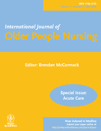
International Journal of Older People Nursing
Exploring the Future of Care for Seniors.The International Journal of Older People Nursing is a pivotal publication in the field of gerontology, focusing on the unique nursing care and health challenges faced by older adults. Published by WILEY and based in the United Kingdom, this journal aims to disseminate innovative research and practice insights from 2010 to 2024, making it an essential resource for academics and practitioners alike. With an impressive 2023 Category Quartile of Q2 in Gerontology, the journal ranks in the top tier of its field, placing it at 15th among 39 journals in Nursing Gerontology according to Scopus. The journal is committed to providing a platform for rigorous scientific inquiry, facilitating improvements in nursing practices, and promoting evidence-based care for older adults. Researchers, professionals, and students can benefit from the high-impact contributions that address the complexities and richness of aging, thus enhancing the quality of care and life for older populations.

Australian Journal of Advanced Nursing
Fostering Excellence in Advanced Nursing EducationThe Australian Journal of Advanced Nursing, published by the Australian Nursing Federation, has established itself as a vital resource in the fields of nursing and advanced nursing practice since its inception in 1983. With an ISSN of 0813-0531 and an E-ISSN of 1447-4328, this peer-reviewed journal aims to disseminate high-quality research, innovative practices, and critical reviews that contribute to the advancement of nursing knowledge and education. With a commendable impact factor and currently positioned in the Q2 quartile in both Advanced and Specialized Nursing and miscellaneous Nursing categories as of 2023, the journal is ranked among the top publications in the field, reflecting its significance and influence in shaping nursing practices and policies in Australia and beyond. The journal provides open access options for a wider readership while specializing in progressive topics that address contemporary challenges in nursing, thus serving researchers, practitioners, and educators alike. It continues to be a cornerstone for advancing the professional development of nursing disciplines, supporting a community that thrives on evidence-based practice and interdisciplinary collaboration.
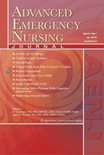
Advanced Emergency Nursing Journal
Advancing Knowledge in Emergency Nursing ExcellenceAdvanced Emergency Nursing Journal, published by Lippincott Williams & Wilkins, stands as a key resource within the domains of Emergency Medicine and Emergency Nursing. With a commitment to advancing the field, this journal provides a platform for rigorous research, critical reviews, and innovative practices aimed at enhancing patient care in emergency settings. Though it holds a Q3 ranking in both related categories as per the 2023 metrics, its global reach spans various aspects of emergency care, promising insights that are crucial for both professionals and academics alike. Covering topics from clinical procedures to policy analysis, the journal invites submissions that aim to bridge theory and practice, highlighting the importance of evidence-based approaches in emergency nursing. Researchers, educators, and healthcare practitioners can Find more information and explore their own contributions in a dynamic environment that continuously evolves with the field. Whether you're seeking to stay current with the latest advancements or to publish your findings, this journal is an essential asset for those dedicated to improving care in urgent medical situations.
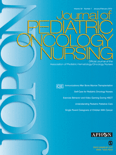
Journal of Pediatric Oncology Nursing
Empowering healthcare professionals in the fight against childhood cancer.The Journal of Pediatric Oncology Nursing, published by SAGE Publications Inc, serves as an essential resource for healthcare professionals and researchers dedicated to the field of pediatric nursing, particularly within oncology. With its ISSN of 1043-4542 and E-ISSN of 1532-8457, this journal has established itself as a key platform for disseminating high-quality research, innovative practices, and case studies that address the unique challenges faced in caring for children with cancer. Despite its coverage in Scopus being discontinued in 2021, the journal previously ranked 4th in the Nursing _ Pediatrics category, illustrating its impact with an 85th percentile rating, and it holds a 10th place rank in Nursing _ Oncology, demonstrating its ongoing relevance in the field. The journal's commitment to open access ensures that vital research findings are available to a global audience, assisting in the improvement of nursing practices and patient care. Engaging both seasoned professionals and aspiring researchers, the Journal of Pediatric Oncology Nursing continues to be a cornerstone for advancing knowledge and enhancing the quality of care for pediatric oncology patients.
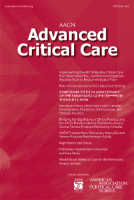
AACN Advanced Critical Care
Empowering healthcare professionals through innovative research.AACN Advanced Critical Care, published by the American Association of Critical-Care Nurses, serves as an essential resource in the field of critical care nursing and emergency medicine. With an ISSN of 1559-7768 and an E-ISSN of 1559-7776, this peer-reviewed journal is committed to advancing the knowledge and practice of critical care through rigorous research and innovative clinical insights. The journal holds a reputable position within its field, achieving a Q2 ranking in Critical Care Nursing and Emergency Medicine, alongside a Q3 ranking in miscellaneous Medicine categories for 2023. With a convergence of scholarly contributions from 2006 to 2024, it strives to explore the latest advancements and challenges in critical care environments, ensuring that its readership of researchers, healthcare professionals, and students are well-informed of emerging trends and best practices. The journal does not offer Open Access, however, its impact and relevance are evident from its Scopus rankings, which place it at a commendable #14 in Critical Care Nursing and #47 in Emergency Medicine. As a crucial platform for knowledge dissemination, AACN Advanced Critical Care plays a vital role in enhancing clinical effectiveness and improving patient outcomes in acutely ill populations.
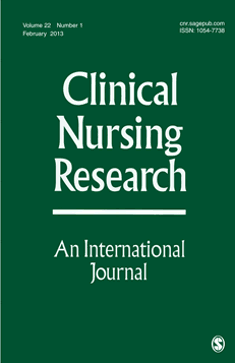
Clinical Nursing Research
Empowering evidence-based practice for better patient outcomes.Clinical Nursing Research is a premier academic journal dedicated to advancing the discipline of nursing through rigorous research and evidence-based practice. Published by SAGE Publications Inc, this journal has been a cornerstone in the field since its inception in 1992, with a commitment to providing high-quality research that informs clinical practice and nursing education. With an impressive Scopus ranking of #40 out of 139 in the general nursing category and a percentile rank of 71, it represents a significant contribution to the nursing literature. Although not an open-access journal, Clinical Nursing Research facilitates access through institutional subscriptions, ensuring that critical findings are disseminated widely. The journal’s objectives include fostering innovation and promoting best practices in nursing, making it an indispensable resource for researchers, practitioners, and students alike. As it continues to evolve through 2024 and beyond, Clinical Nursing Research remains at the forefront of nursing scholarship, addressing the complexities of healthcare in a rapidly changing world.
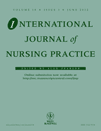
International Journal of Nursing Practice
Empowering healthcare with evidence-based nursing practices.International Journal of Nursing Practice, published by WILEY, is a premier academic journal dedicated to the field of nursing, with a keen emphasis on innovative nursing practices and advancements in healthcare. Established in 1995, the journal has successfully bridged a vital gap in nursing research and practice, featuring rigorous peer-reviewed articles that cater to both academic and clinical audiences. Rated as a Q1 journal in Nursing (miscellaneous) for 2023, it ranks at an impressive #29 out of 139 in General Nursing on Scopus, placing it firmly within the top 21% of its category. The journal serves as an essential resource for nursing professionals, researchers, and students alike, fostering evidence-based practices and enriching the global discourse in nursing. With an increasing focus on interdisciplinary work, the International Journal of Nursing Practice aims to enhance the quality of care provided to patients and support the continuous education of healthcare providers. Stay updated with cutting-edge research and share your contributions to this dynamic field!
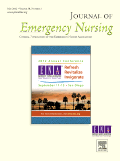
Journal of Emergency Nursing
Advancing Emergency Care Through Research and InnovationJournal of Emergency Nursing, published by Elsevier Science Inc, serves as a premier platform for advancing the field of emergency nursing. Since its inception in 1975, this peer-reviewed journal has established itself as a vital resource for researchers, practitioners, and educators alike, with a notable impact factor and current ranking of #8 out of 32 in the Emergency Nursing category, placing it in the 76th percentile. The journal's commitment to the dissemination of high-quality evidence, innovative practices, and essential insights makes it an indispensable tool for those seeking to excel in acute care settings. Although not open access, the Journal of Emergency Nursing is dedicated to fostering knowledge and improving patient outcomes through robust research and comprehensive reviews, aligning closely with its mission to enhance emergency nursing practices and education through every issue until 2024 and beyond. For professionals and students keen on staying at the forefront of emergency care advancements, this journal provides a wealth of knowledge and resources, reflecting the critical issues and developments shaping the future of healthcare.
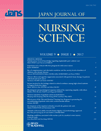
Japan Journal of Nursing Science
Fostering Excellence in Nursing Through Rigorous ResearchJapan Journal of Nursing Science, published by WILEY, serves as a pivotal resource in the field of nursing, focusing on innovative research and theoretical developments that enhance nursing science practices. With an ISSN of 1742-7932, this journal has established itself as a reputable platform, reflected in its 2023 rankings, which place it in the Q2 category for both Medicine (miscellaneous) and Research and Theory. Covering a broad range of topics crucial to the advancement of nursing, the journal provides researchers, professionals, and students access to high-quality studies, methodologies, and discussions that shape contemporary nursing practices and policies. Though not an Open Access journal, it contributes significantly to the academic discourse and research community, with emphasis on fostering evidence-based practices and promoting excellence in nursing education and healthcare delivery. With a cumulative publishing history from 2006 to the present, the Japan Journal of Nursing Science is committed to disseminating vital knowledge that enriches the nursing profession and improves patient care.

Revista Rol de Enfermeria
Nurturing Professional Growth Through Scholarly InsightsRevista Rol de Enfermeria, published by EDICIONES ROL S L, is a distinguished peer-reviewed journal that has been a cornerstone of nursing knowledge and practice since its inception in 1980. With a specific focus on the field of nursing and healthcare, this journal serves as a vital platform for researchers, clinicians, and educators to disseminate their findings, enhance professional practices, and support the development of evidence-based nursing care. Although its coverage in Scopus has been discontinued as of 2016, the journal has maintained an essential role in the nursing community, contributing to the advancement of general medicine as evidenced by its ranking in Scopus at #679 out of 862, placing it within the 21st percentile. While Revista Rol de Enfermeria does not currently offer an open access model, its historical significance and thematic relevance make it a valuable resource for professionals seeking to stay informed about the latest developments in nursing research and education. Situated in Barcelona, Spain, it continues to reflect the dynamic evolution of nursing practice across diverse healthcare landscapes.